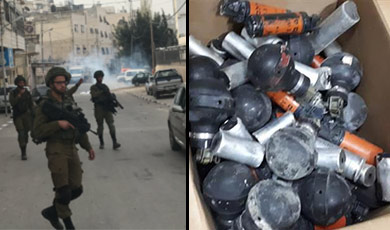Learn about the history of the Palestinian struggle for freedom, equality and justice by exploring major events in the history of their oppression on this day of the year.
18 November
 ROUTINE ARMY TEARGAS ATTACKS ON SCHOOLS
ROUTINE ARMY TEARGAS ATTACKS ON SCHOOLS
On this day in 2018, despite strenuous Israeli Army denials, a video surfaced showing an Israeli soldier throwing tear gas into the Al Khalil School in Hebron. The head teacher keeps a box with dozens of used grenades and canisters thrown at the school over a short period. Israeli soldiers group Breaking the Silence said that “thousands of Palestinian students are suffocating from tear gas [and that such] violence against children is an unavoidable part of the military dictatorship ruling a civilian population”.
هجمات الجيش الروتينية بقنابل الغاز على المدارس
18 نوفمبر
في مثل هذا اليوم من عام 2018 ، وعلى الرغم من النفي الشديد للجيش الإسرائيلي ، ظهر شريط فيديو يظهر جنديًا إسرائيليًا يلقي الغاز المسيل للدموع على مدرسة الخليل في مدينة الخليل. يحتفظ مدير المدرسة بصندوق به عشرات القنابل اليدوية والعبوات المستعملة التي ألقيت على المدرسة خلال فترة قصيرة. قالت مجموعة جنود الاحتلال الإسرائيلي "كسر جدار الصمت" إن "آلاف الطلاب الفلسطينيين يختنقون بالغاز المسيل للدموع [وأن هذا] العنف ضد الأطفال هو جزء لا مفر منه من الدكتاتورية العسكرية التي تحكم السكان المدنيين.
The video, obtained by Israel’s Haaretz newspaperr, shows an Israeli soldier throwing a canister into the school’s yard, followed by tear gas rising from it. Last week, Palestinians reported to Breaking the Silence - an anti-occupation Israeli NGO that collects reports about abuses by the regime soldiers in the Palestinian territories - an increase in the scope of tear gas launched at al-Khalil schools, including primary schools. In response to a query posed by Haaretz to the Israeli military last week, the army spokesperson claimed the military does not launch stun grenades or tear gas into schools.
The video, taken on November 18 outside the al-Khalil School for Boys, supported Palestinian teachers' claims that Israeli troops throw canisters at the school on a daily basis.
Christian Peacemaker Teams in Al Khalil/Hebron: Schoolchildren exposed to teargas seven of the last eight days
Israeli soldiers have shot teargas and sound grenades at children who cross checkpoints 29 and 209 on their way to school in the morning on seven of the last eight school days.
International observers and human rights workers in Hebron have witnessed Israeli soldiers repeatedly firing grenades and sound bombs into the streets near these checkpoints while children are walking to school. The children attend several schools located both in the Old City and in the area of Hebron designated as H2, on the other side of the checkpoints, and include preschool students as young as four. Depending on where they live and which school they attend, children must cross these checkpoints in both directions to reach schools both inside the old city and in H2.
The Israeli military does not allow buses that transport younger children to preschool and kindergarten classes in H2 to cross the checkpoints; very young children living in the Old City must walk through these checkpoint areas in order to reach their school buses.
At times, the use of teargas by soldiers has been in response to several children throwing stones, but internationals have also witnessed soldiers firing teargas canisters without provocation. In any event, because so many children pass through the same area to reach school at the same time, hundreds of children, many of them in primary grades, suffer the effects of gas on an almost daily basis. Additionally, because the agents used to manufacture teargas are actually solids, they remain inside shops, on clothing, and in the streets where children walk and play throughout the day.
Tear gas is a non-lethal chemical weapon that stimulates the corneal nerves in the eyes to cause tears, pain—which can be extreme, immediate and severe nausea, and even blindness. Longer term effects include persistent coughing, shortness of breath, and other lung-related problems (heightened in people who already have lung problems), heart and liver damage, delayed menstruation, and an increase in miscarriages and stillbirths in women exposed to the gas. The NGO Physicians for Human Rights believes that “‘tear gas’ is a misnomer for a group of poisonous gases which, far from being innocuous, have serious acute and longer-term adverse effects on the health of significant numbers of those exposed.”
1-minute video: grinning Israeli soldiers in Hebron fire tear gas and stun grenades at school children
